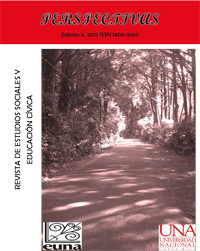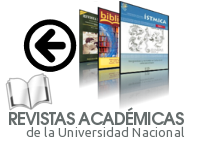The construction of Costa Rican ideology by the Catholic Church hierarchy, 1850-1920.
Keywords:
Education, Roman Catholic, expression to the sense of Costa Rican-nessAbstract
The main purpose of this article is to reveal how the Roman Catholic Clergy of 1850-1920 collaborated with the State in molding, transmitting and consolidating the ideology that gives expression to the sense of Costa Rican-ness. This action was carried out with the intervention of the Catholic priests located in the different communities of the country, who were responsible for implementing the mandates jointly agreed upon by the Church and the State.
The Roman Catholic Clergy established that those individuals that wished to be legally recognized as Costa Rican citizens should meet the following requirements: obey the established law and order; support and defend the State, its institutions and its political agreements;respect certain public sanitary dispositions; respond to an educational system proposed by the government and the Church; defend the country, its liberty, its religion, the institution of the family, and the country’s patrimony in times of international conflicts. Finally, the Church established that Costa Ricans should always manifest Christian charity. The article explains the way in which the Roman Catholic Church disseminated these norms among the people and how this ideology served to the interest of both, the Church and the civil government
Downloads
Published
How to Cite
Issue
Section
License
Los autores que publican en esta revista están de acuerdo con los siguientes términos:
a) Los autores conservan los derechos de autor y garantizan a la revista el derecho de ser la primera publicación del trabajo bajo una Licencia Creative Commons Atribución-NoComercial-CompartirIgual 4.0 Internacional (https://creativecommons.org/licenses/by-nc-sa/4.0/) que permite a otros compartir el trabajo con un reconocimiento de la autoría del trabajo y la publicación inicial en esta revista (componente BY o atribución). Coincidente con la política de Acceso Abierto, no se podrán hacer usos comerciales de los contenidos publicados por esta revista (componente NC). Se permitirán las obras derivadas (remezcla, transformación o creación a partir de la obra original) siempre y cuando sean distribuidas bajo la misma licencia de la obra original (componente SA).
b) Los autores pueden establecer por separado acuerdos adicionales para la distribución no exclusiva de la versión original de la obra publicada en la revista (por ejemplo, situarlo en un repositorio institucional o publicarlo en un libro), siempre y cuando: a) sea reconocida la publicación original en esta revista (componente BY); b) no se haga uso del material de reuso con propósitos comerciales (componente NC); c) el material de reuso sea distribuido bajo la misma licencia de la obra original (componente SA).
c) Se permite y se anima a los autores a difundir sus trabajos electrónicamente (por ejemplo, en repositorios institucionales o en su propio sitio web) antes y durante el proceso de envío, ya que puede dar lugar a intercambios productivos, así como a una citación más temprana y mayor de los trabajos publicados (Véase The Effect of Open Access) (en inglés).



_11.55_.09_a_._m_._.png)
_1.34_.01_p_._m_._2.png)
_9.45_.02_p_._m_._.png)




_2.23_.09_p_._m_._.png)
_2.35_.17_p_._m_._.png)

